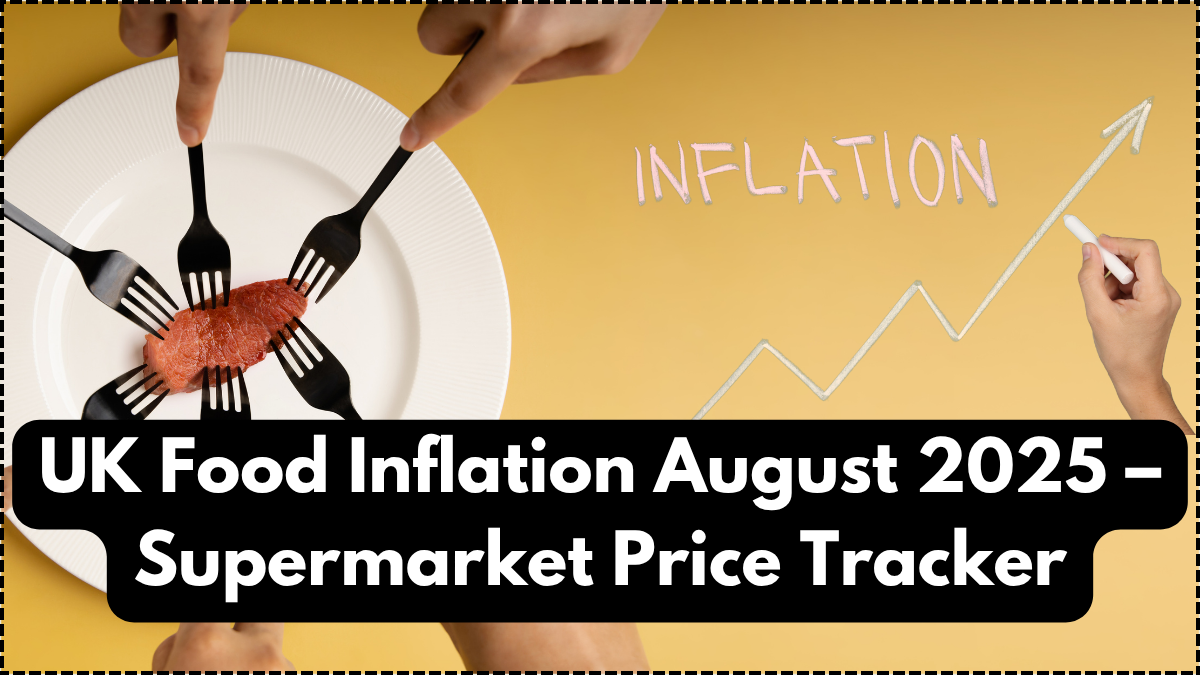Food price inflation UK remains a pressing concern for households, with August 2025 data showing mixed signals across key grocery categories. Consumers are keeping a close eye on every pound they spend, and the government is facing pressure to curb rising costs. With essentials like bread, milk, and vegetables seeing notable price adjustments, families are increasingly relying on every available tool, including a supermarket price tracker, to manage their weekly shopping bills.
As economic conditions continue to fluctuate, food costs have become one of the most visible markers of inflation for everyday consumers. The August update shows that some items have stabilized, while others have surged due to supply chain issues and higher transport costs. Understanding the latest Food price inflation UK figures helps not only policymakers but also shoppers who need to plan their budgets more carefully.

What the August Numbers Reveal
The latest figures from August 2025 reveal that while headline inflation is slowing slightly, food prices remain stubbornly high. Items like dairy and bakery goods are among the most affected, showing an increase of up to 6% compared to July. On the other hand, fresh fruits and certain cereals saw a slight dip in prices. A detailed supermarket price tracker shows how differently each product category behaves under the broader Food price inflation UK trend.
The cost variations are influenced by factors ranging from global commodity prices to local harvest conditions. For example, an early summer drought impacted vegetable yields, while better-than-expected wheat harvests brought down bread prices marginally.
Key Grocery Price Changes – August 2025
Here’s a breakdown of average price changes for common grocery items based on the latest supermarket price tracker:
| Grocery Item | July 2025 Price (£) | August 2025 Price (£) | % Change |
|---|---|---|---|
| Milk (2L) | 1.65 | 1.72 | +4.2% |
| Bread (loaf) | 1.20 | 1.18 | -1.6% |
| Eggs (dozen) | 2.60 | 2.75 | +5.7% |
| Tomatoes (1kg) | 2.90 | 3.05 | +5.2% |
| Rice (1kg) | 2.10 | 2.08 | -1.0% |
This table underscores how Food price inflation UK is uneven across categories. While some staples have inched down, others, like eggs and tomatoes, continue to climb.
Why Tracking Prices Matters
For families and businesses alike, having a reliable supermarket price tracker is crucial. Consumers are increasingly turning to online tools and apps that provide live updates on grocery prices. These tools help identify which supermarkets offer the best deals, making it easier to navigate the pressures of Food price inflation UK.
Small businesses, including cafes and restaurants, are also affected. Their operational costs rise when ingredient prices surge, and these costs often get passed on to customers. Understanding the price shifts helps them make smarter purchasing and menu decisions.
The Bigger Picture – What’s Next for UK Shoppers?
Economists predict that Food price inflation UK might ease slightly toward the end of 2025 if global supply chains stabilize. However, experts warn that any unexpected weather events or geopolitical tensions could trigger another round of price spikes.
For now, using tools like a supermarket price tracker and making strategic shopping decisions—like buying seasonal produce or bulk items—remains the best way for consumers to offset rising costs. Awareness and adaptability will play a major role in how households cope in the coming months.
Conclusion
The August 2025 snapshot makes one thing clear: Food price inflation UK is far from over, even if certain items show temporary relief. Shoppers and businesses must stay vigilant, using every resource, including a supermarket price tracker, to stay informed. By doing so, they can navigate the uncertain landscape of grocery pricing and protect their budgets against unexpected surges.
FAQs
What is the current Food price inflation UK rate for August 2025?
The latest data shows food prices rose by around 4–5% in August 2025, with key items like eggs and tomatoes seeing the steepest increases.
How does a supermarket price tracker help consumers?
A supermarket price tracker helps shoppers compare grocery prices across different chains, making it easier to find deals and save money.
Are any food items getting cheaper in the UK right now?
Yes, some staples like bread and rice have seen slight decreases according to the August supermarket price tracker data.
Will Food price inflation UK improve by the end of 2025?
Economists expect modest improvement by late 2025 if supply chains stabilize, but sudden disruptions could still push prices higher.
Click here to learn more